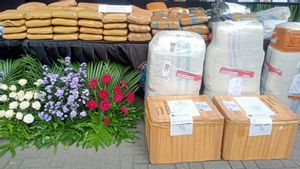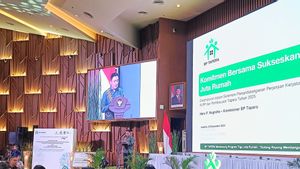JAKARTA - The tweets of social media activist Bachrum Achmadi were highlighted by netizens after bringing up the traces of the descendants of the Minister of Religion Yaqut Cholil Qoumas and the Army Chief of Staff (KSAD) General TNI Dudung Abdurachman.
In his tweet as reported on Wednesday, March 2, Bachrum wrote that Minister of Religion Yaqut is the son of an elder from Nahdlatul Ulama (NU) to Army Chief of Staff Dudung, the grandson of Wali Songo. As of this writing, the tweet had 1,583 likes and 239 Retweets.
"Yakut is the son of an old NU Kiai, Dudung is Walisongo's grandson. So why really...? It's against the kiai's son, Walisongo's grandson that it's guaranteed to be the most correct? Dreaming!," tweeted Bachrum on Twitter @bachrum_achmadi.
One of those who responded was the Executive Director of the Center for Youth and Population Research (CYR), Dedek Prayudi. Hotly, Dedek responded to Bachrum's tweet.
"When we talk about Gus Yaqut and Jend Dudung, the mindset is egalitarian. Try talking about Rizieq and Bahar using the same mindset," tweeted the former PSI spokesman on his Twitter account, @Uki23.

The name of the Minister of Religion Yaqut has recently been highlighted because of his controversial statement. Starting from the explanation of the Minister of Religion Yaqut regarding the circular regulating the use of Toa in mosques and prayer rooms.
The issuance of this SE is to maintain harmony in society. Minister of Religion Yaqut then gave an illustration if there is a Muslim who lives in a non-Muslim environment who keeps a dog and will surely be disturbed by the sound of the dog.
"Regarding the rules for the call to prayer, we have issued a circular regulation. We do not prohibit mosques from using Toa, no. Go ahead. Because it is the symbol of Islam," said Yaqut at the Riau Province Regional Building, Wednesday, February 23.
Even so, he asked Toa's volume to be set to a maximum of 100 dB (decibels). In addition, the usage time is adjusted every time before the call to prayer.
"But this must be regulated how the speaker volume cannot be loud, 100 dB maximum. It is set when they can start using the speaker before and after the call to prayer. There is no prohibition," Yaqut emphasized.
Yaqut considered that the rules were made only to create a sense of harmony in the community. Including increasing benefits and reducing those that are not useful.
"This rule was made solely to make our society more harmonious. Increase the benefits and reduce the disadvantages," he said.
Yaqut considered Toa's voices in the mosque to be a form of syiar. Only, if it is turned on at the same time, there will be interference.
"Because we know, for example, in areas where the majority of Muslims are. Almost every 100-200 meters there are mosques. Imagine if at the same time they lit the Toa together at the top. .
"Let's imagine again, I am Muslim, I live in a non-Muslim environment. Then the house of worship for our non-Muslim brothers and sisters performs the prayer five times a day loudly, that's how it feels," said Yaqut again.
He then gave an example of other sounds that could cause disturbance. One of them is the sound of a dog barking.
"The simplest thing is, if we live in a complex, for example. Left, right, front and back, all keep dogs. For example, barking at the same time, are we disturbed or not? What do these sounds mean? we arrange it so that it does not become a disturbance. Speakers in the mosques are welcome to use, but please arrange them so that they are not disturbed," he said.
Yaqut then requested that Toa's voice be timed. So the intention to broadcast does not cause public disturbance.
"So that the intention to use speakers as a means, doing syiar can still be carried out and does not interfere," said Yaqut.
The English, Chinese, Japanese, Arabic, and French versions are automatically generated by the AI. So there may still be inaccuracies in translating, please always see Indonesian as our main language. (system supported by DigitalSiber.id)













